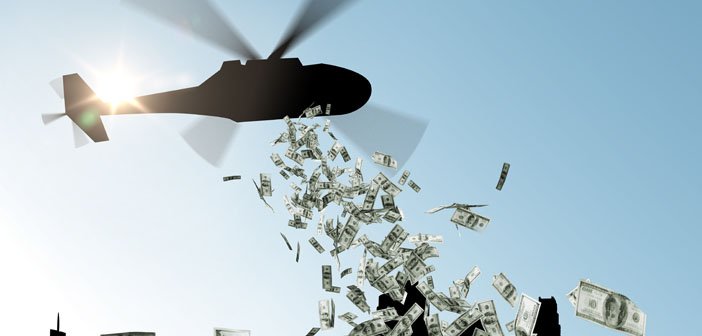The German Weimar Republic did it in the 1920’s, Zimbabwe did it in the 2000’s and countless other countries since. Both of these though caused hyperinflation in the 000%.
They called it printing money we call it Quantitative Easing. The UK, The USA, the Eurozone and Japan have been QE’ing since the financial crash to the tune of billions of pounds. The US Fed once had a balance sheet of $4.5trn. Yes, we’ve been printing money on an enormous scale. Although it’s not physical notes as in the Weimar republic, it’s electronic money.
Let me explain how it works simply and then we can have a look at the effect as it comes to an end, because it is going to end, and that’s the worry. But knowing allows you to plan and advise clients.
The financial crash saw banks around the world suddenly losing the value of their assets or capital. The value just dropped. The main culprit as we know, were mortgage backed securities (MBSs). They were bailed out by various governments. Here in the UK we bailed out RBS to the tune of £45 Billion to bolster their balance sheet and we still hold the majority shares, 10 years later.
But it wasn’t enough to encourage them to start lending again, instead they just tried to rebuild their balance sheets, and you would have done too.
The governments wanted them to lend, thus ensuring economic growth, prosperity and employment so they started QE’ing on a gigantic scale.
Stopping and then reversing QE will have dramatic effects
What happens is the Bank of England suddenly comes into a lot of money from nowhere, since it has just been magicked out of thin air. This goes into their imaginary balance sheet. So, the Bank has £300 Billion to play with. They then buy government gilts and bonds from the market but not from the stock market, initially from the banks. This allowed the banks to offload their bonds to the Bank of England for cash which they then lent out at very low rates. Which they did and caused the UK to come out of recession and return to a near full employment buoyant economy in very little time.
Latter QEs bought bonds straight from the stock market which artificially has kept interest rates low, bond and other asset prices high. We really should be at base rate 3% if it hadn’t been for QE. QE rescued us from financial meltdown or depression but we’ve been wallowing in a “drunken haze and heaven knows we’re miserable now”. (The Smiths – Louder than Bombs)
It has done the job it was planned for but now we must go cold turkey.
Cold turkey is an expression for those addicted to drugs or alcohol suddenly having to stop them. There are repercussions, sweats, headaches and depression.
Stopping and then reversing QE will have dramatic effects. We’re stopping it after our last bout following the Brexit referendum but the USA stopped a while ago. The Eurozone is still at it.
Stopping means the market must buy all the bonds released rather than the Bank of England. Virtually all of the government bonds issued by the world’s top ten richest countries have been absorbed by central banks.
Simply this will push up the rates on these bonds. Think about it, with the Bank no longer buying them at whatever the interest rates were, means the markets must. This means institutional investors here and abroad must soak up the supply, but their appetite is not there. Therefore, to entice them interest rates will go up, Simple.
The next stage is the reversal of QE which the USA is starting now. This means the Bank selling all the bonds they have in the coffers into the market. Supply massively increases, bond prices will soar.
Couple this with Governments around the world still financing their budget deficits (we still have a massive deficit), the only option is to issue new bonds. These hit an over supplied market so what do they do? Issue them at higher interest rates. Already the US Fed’s rate has hit 2%
We won’t get hyperinflation, but we will get higher interest rates.
This combined with tighter monetary conditions will cause currencies will grow stronger to entice the inflow of money from abroad
Inflation? Now that’s another story
Did I also mention that QE has artificially held assets high such as bonds, shares and house prices? This could be a bubble about the burst. Probably the Stock Market will tank first but I don’t think house prices here in the UK will except inflated areas such as London, the South East and a few towns. Supply of housing is so limited and takes time to increase, demand will maintain prices as they are. We’ll probably have a trickle upward but below inflation, so prices will lose in real terms but the threat of negative equity won’t reveal itself. Just many years of motionless grown. But then again as the old adage goes “a home is for nesting not investing”




